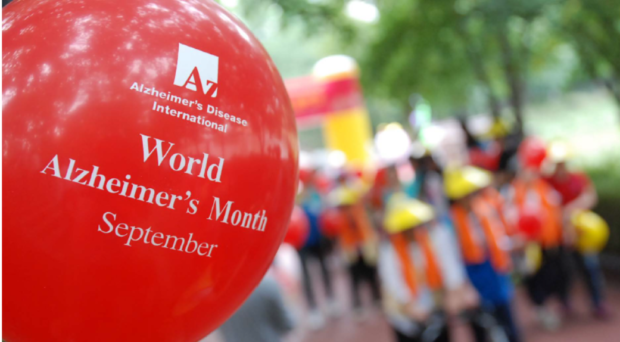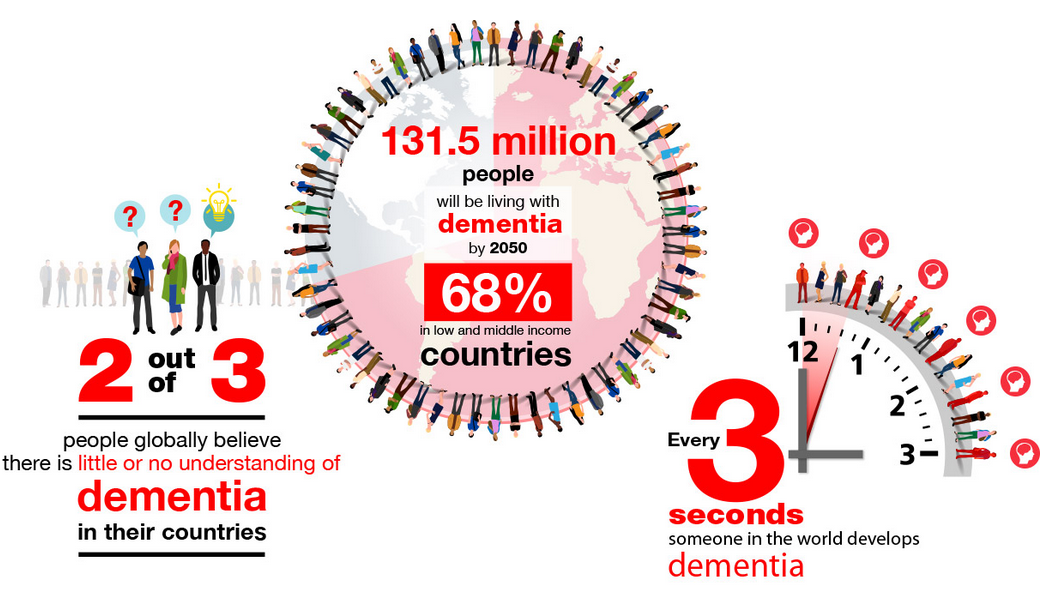
Every 3 seconds someone in the world develops dementia, the collective term for degenerative, progressive brain syndromes which affect 47 million people worldwide, and can cause changes to a person’s memory, thinking, behaviour and emotion. Alzheimer’s Disease is the most common form of dementia, accounting for between 50-75% of all cases.
Dementia commonly occurs in the later stages of life but is not a part of normal ageing. Early onset dementia also affects individuals who are under the age of 65. Symptoms of dementia vary by person, but typically share some characteristics including loss of memory, difficulty in performing previously routine tasks and personality and mood changes.
Although each person will experience dementia in their own way, those affected are eventually unable to care for themselves and need help with all aspects of daily life. There is currently no cure for most types of dementia, but treatments, advice, and support are available.
Alzheimer’s Disease International (ADI) is the umbrella organisation of Alzheimer associations around the world. We aim to help establish and strengthen Alzheimer associations and to raise global awareness about Alzheimer’s disease and all other causes of dementia.
Our activities include supporting the training of healthcare workers and caregivers to people with dementia, contributing to global knowledge on dementia and advocating to improve the quality of life for people living with dementia and their families everywhere, through official consultative status with the World Health Organisation (WHO), and active collaboration with governments and policy makers worldwide.
World Alzheimer’s Month is the global awareness campaign led by Alzheimer associations around the world to raise awareness and challenge the stigma that surrounds the disease. World Alzheimer’s Day on 21 September is an opportunity each year to unite in the global call for a better quality of life and support for people with dementia. The fifth World Alzheimer’s Month was marked this year by health workers, governments and organisations in over 60 countries.
Activities held in support of the campaign educate individuals, businesses and stakeholders to recognise the early warning signs of dementia and understand the experience of those living with the disease by discussing dementia openly, challenging fear and offering support for those affected by the disease.
In some countries, people living with dementia face more pronounced exclusion, and may be seen as ‘witches’ due to lack of awareness of the confusing symptoms that may accompany the dementia.
World Alzheimer’s Month remains a time for action, by calling on policy makers and governments around the world to increase the level of support available, but also a time to remember those who are already living with the disease, their families and caregivers by extending services, training for caregivers and social activities that actively include them in the communities where they live.
This year’s theme during World Alzheimer’s Month was ‘Remember Me’. We asked people to get involved by visiting the World Alzheimer’s Month website and sharing materials designed to raise awareness of the campaign with their colleagues, friends and family. We asked individuals around the world to share a message or image of a memory of a loved one or others who were affected by the disease.
The website contained helpful advice on contacting the Alzheimer association in your country, but also on joining events held to draw attention to the disease worldwide.

As the global population ages, awareness of and support for those living with dementia will become more important, and dementia is increasing being recognised by governments around the world as one of the most significant global health crises of the 21st century. Despite this, people diagnosed with dementia often receive a lower standard of care and face exclusion from everyday life, while millions more do not receive a diagnosis at all.
By 2050, the number of people affected by dementia is estimated to almost treble, to more than 131 million people. ADI will continue to do everything possible to reduce this number by advocating for risk reduction and finding new treatments. By supporting World Alzheimer’s Month in the future, you can help us maintain global momentum to support prevention, care and inclusion of those with the disease.
Comments